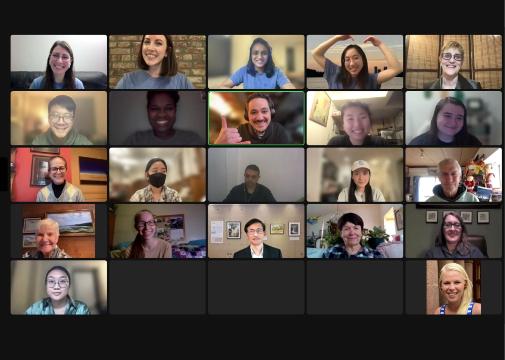
The Society for International Education (SIE) is a student-led organization at Teachers College, Columbia University that aims to promote an academic, professional, and social network for students and alumni/ae who share a special interest in the field of International and Comparative Education Development. Every year, SIE organizes (UN)Spoken: A Celebration of International Mother Language Day (IMLD) in observance of the International Mother Language Day held worldwide on February 21st. Originally proposed by Bangladesh, IMLD was approved by UNESCO at the 1999 UNESCO General Conference and has been observed throughout the world since 2000. SIE adheres with UNESCO’s beliefs in the importance of cultural and linguistic diversity for sustainable societies and aims to promote multilingualism, particularly non-dominant languages that are sometimes unspoken or invisible.
This year marked the seventh International Mother Language Day celebrated by SIE at Teachers College. Due to the ongoing Covid-19 pandemic, IMLD 2022 was held in a virtual format for the second year in a row. SIE was fortunate to have presentations by Dr. Carol Benson, Associate Professor of International and Comparative Education at Teachers College and SIE Faculty Advisor, and Dr. Maung Nyeu, award-winning author of multilingual children’s books and co-chair of Indigenous Knowledge and the Academy in the Comparative and International Education Society. This year’s celebration also saw a wide array of languages represented by students and scholars. A folk song in Marathi, poem recitals in Japanese and Chinese, a Turkish language lesson, traditional dance from different countries, and a Chinese martial arts act were among the outstanding performances.
For this virtual celebration, SIE also hosted a seven-day asynchronous film screening for the award winning film Eating Up Easter. Following the screening of the film, we held a Q&A session with the film’s director, Sergio Mata’u Rapu. Led by SIE Vice President Tracie Jarrard and Secretary Jingran Su, the discussion was organized across three overarching themes emerging from the film: languages, environmental issues, and globalization. We chose this film because it raises awareness on the interconnected nature of sustainable development, colonization, and Indigenous people’s languages and cultures. Given that diversity is directly related to stability, adaptability, and long-term survival, and that the most diverse ecosystems are the strongest ones, it is paramount to include environmental conservation and linguistic conservation on the same agenda.
Eating Up Easter is a beautiful, compelling, and challenging film that leaves the audience both in awe of the beauty of Rapa Nui and troubled by the familiarity of the island’s problems known to so many places across the globe. Through Rapa Nui people’s own voices, the film brings great attention to the negative cultural and environmental impact of tourism and globalization on the island, while also shedding light on the efforts of individuals to drive more sustainable and culturally respectful projects. Mama Piru leads the recycling projects that try to cope with the unprecedented amount of waste that stays on the island after tourists are gone. Enrique and Mahani work hard to make their dream of a sustainable music school for all Rapa Nui children come true. And Sergio’s father makes efforts to bring development and better life conditions to everyone on the island, while navigating the tensions of globalization and cultural preservation.
Eating Up Easter suggests that the lessons learned from Rapa Nui could be replicated and taught in other, larger communities. However, Sergio acknowledges that it can be difficult to take responsibility for your consumption habits in big cities where you do not really see or understand the waste disposal processes and recycling programs. That is why the role of education is crucial in fostering community engagement to build sustainable systems moving forward. We hope that this film and the discussion with Sergio Mata’u Rapu trigger students’ reflection on the intersectionality of language revitalization, decolonization and sustainability, and that we take actions based on a holistic understanding of these issues, rather than separating one from the other. Eventually, we make changes towards a diverse, inclusive and thus more sustainable world.